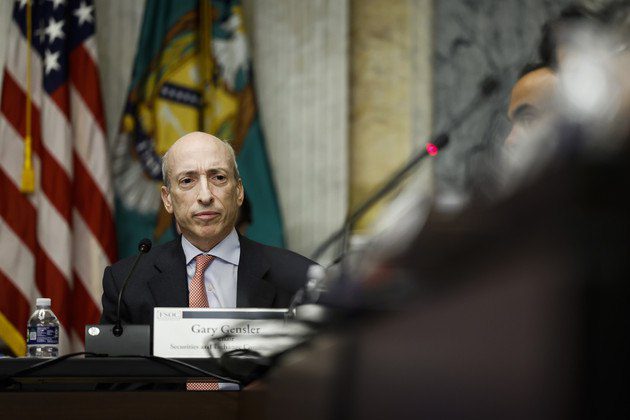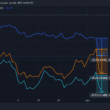Quick take:
- Gary Gensler claims the “US does not need mode digital currency, because it already has the dollar.”
- The SEC chief was speaking to the media following the US capital markets regulator’s lawsuits against Binance and Coinbase.
- Gensler claims there are parallels between the case against Binance CEO and the criminal case against Sam Bankman-Fried.
The Securities and Exchange Commission has continued with its crackdown on the crypto industry’s biggest companies. On the second day in a row, Coinbase becomes the next crypto exchange facing a lawsuit amid allegations of operating illegally as a broker.
The US capital markets regulator has been tightening rules on crypto trading since last year, including lengthy investigations on Binance.
And based on today’s evidence, it does not seem like the SEC and its chief Gary Gensler is going to stop any time soon.
On Monday, Binance came up with its own version of events, accusing the SEC of trying to unilaterally define the crypto industry. But Gensler, speaking to CNBC on Tuesday, was quick to refute any ‘industry muddying’ claims made the Binance co-founder and CEO Chengpeng (CZ) Zhao.
Gensler has an ongoing case against Sam Bankman-Fried, the co-founder of collapsed crypto exchange platform FTX, and CZ. In the interview, he argued that there are parallels between the two cases.
According to Gensler, the question about a lack of clarity in crypto regulation is a non-issue. “There’s been clarity for years,” he said, adding “These intermediaries need to come into compliance.”
The SEC chief even went on to suggest that with the dollar, the US does not need more digital currencies.
But the SEC’s posture has been interpreted as being anti-crypto, which has seen some players in the industry look to overseas markets.
Coinbase has already hinted at moving its operating base to Dubai, after recently stating that it sees the UAE as a potential international hub. On the other hand, CZ recently said in Twitter spaces that his company already boasts more than 700 employees based in Dubai.
Given Gensler’s comments and the growing perception that US restrictions could continue to push crypto companies away from the country, we asked industry players what impact this could have on the industry.
Tim Haldorsson, the CEO of Crypto and Web3 marketing agency Lunar Strategy thinks the SEC’s latest actions could push more crypto companies outside of the US. Echoing Coinbase’s views, Haldorsson says: We’re seeing a partly geographical shift in crypto, with the Middle East, particularly Dubai, rapidly becoming a hub for crypto companies. Their proactive regulation and embracing approach toward technology are some of the key factors. So, while regulatory climates may vary across geographies, the global nature of the crypto industry ensures its resilience and continued growth.”
Roy Liu the Founder of Superpower Labs also expects the more crypto-friendly countries to take the industry forward regardless of what happens with the US. “Asia & The Middle East will win the race for crypto innovation, community and liquidity, while the US is wasting time figuring out trad-fi vs crypto policy between democrats & republicans. Republican representatives Trump and DeSantis are pro-crypto.”
On the other hand, Phillip Kassab, Growth Lead at Sei Labs thinks this could have a positive impact on crypto, pushing activity away from centralised exchanges towards on-chain ecosystems.
“While the U.S.’s current ‘anti-crypto’ posture might seem detrimental, it could indirectly catalyze a push towards increased on-chain activity, thus strengthening the essence of decentralization that defines the crypto industry. This ironic twist might lead to a more resilient and autonomous blockchain ecosystem, fostering a future less susceptible to centralized interventions,” said Kassab.
However, Hannah Hamilton, Co-founder of Asymmetry Finance thinks there will be certainly some casualties, highlighting small-cap tokens as the likely victims. “It may affect smaller cap tokens in the short term, but it will have no effect on the long-term utility of blockchain technology,” she said, adding, “We can reorganize our structures to be compliant with the clearer guidelines, but the base products will likely remain the same.”
Justin Garland, also Co-founder of Asymmetry Finance flipped the cause-and-effect chain of events zeroing in on how the US’ anti-crypto stand could affect innovation in the country, setting it back behind countries that are more flexible on crypto regulation. “Short term the anti-crypto stance hurts innovation in the US, which has the potential to set it back against its peers that are creating legislation to encourage digital asset companies to open their doors there.”
However, Garland believes that the jury is still out regarding the long-term impact on the crypto industry, adding that the free market will decide which technology perseveres.
Robert Masiello co-founder of Arcade thinks the US could lose more than just the power to innovate.
“[If the US is clearly anti-crypto], then it’s obvious that US companies and developers will go elsewhere globally. That’s a large tax-paying base that will go somewhere else. If it’s not anti-crypto then it needs to clearly state what the companies behind certain tokens are doing differently than one another because there’s really no consistency,” said Masiello.
One interesting response came from Hifi Finance CEO Doug Leonard, who thinks the US is not anti-crypto, placing the current friction between crypto exchanges and the SEC squarely on the “outdated framework that the regulator is using to govern novel coordination mechanisms that have some financial aspects in them.”
“Anytime you try to fit a square peg into a round hole, there’s going to be gaps. We’re seeing those gaps, and it’s creating uncertainty in the market,” Leonard said, adding that if the country does not create a friendly environment for the crypto industry to thrive, then it could be left behind.
Building on Leonard’s comment, it is clear see why there could be an argument that the US is not as anti-crypto as the headlines might suggest.
Its currency, the US dollar is widely used as there to several cryptocurrencies, which could be the point Gensler was making when he said the country does not need more digital currencies.
“We have not seen, over the centuries, that economies and the public need more than one way to move value,” added Gensler.
Based on this statement, we also asked crypto industry players to chip in on the matter.
Leonard thinks the US dollar will continue to play a pivotal role in the crypto space because it is the world’s reserve currency.
“The dollar will play a role in blockchain and the tokenization of assets. I don’t think that the government is ready to [fully embrace] blockchain technology. But they might be ready to take on a digital dollar that is like a central bank digital currency.”
And Masiello and Haldorsson both agree with Leonard’s statement. According to Masiello, the US economy plays an important role in the global markets. “The dollar will always be as relevant as the US is the world’s dominant economic, cultural, and military power. People need a way into the system, that’s typically through the dollar – crazy to envision that not being relevant.”
On the other hand, Haldorsson highlighted the role of “dollar-backed stablecoins as an important on-ramp for individuals and businesses who are looking to hold their reserves in stable assets.” No other currency around the world provides this stability, added Haldorsson.
Superpower Labs’ Liu seems to echo the same sentiment saying the dollar will continue to be a major peg in the world for the foreseeable future. “That said, the CBDC per country can largely support ad-hoc transactions between countries and regions without USD or SWIFT. De-dollarization has already started.”
But to retain its status as a major stablecoin peg, Asymmetry Finance’s Hannah Hamilton believes the dollar must retain its status as the world’s reserve currency. “It will likely be the most dominant peg in the stablecoin ecosystem. However, if other markets develop strong and non-invasive CBDCs, like the EU developing their digital Euro, they could gain in market share, dominance, and reserve currency status.”
On the other hand, Sei Labs’ Kassab thinks the US dollar’s dominance in the digital economy could be reduced significantly. It may not be as pronounced as it is in traditional economics.
“While the dollar will likely continue to play a major role in the digital economy, its dominance may not be as pronounced as it is in the traditional economic system, as decentralized digital assets become increasingly integrated into our economic structures,” he said.
****
Stay up to date:
Subscribe to our newsletter using this link – we won’t spam!





